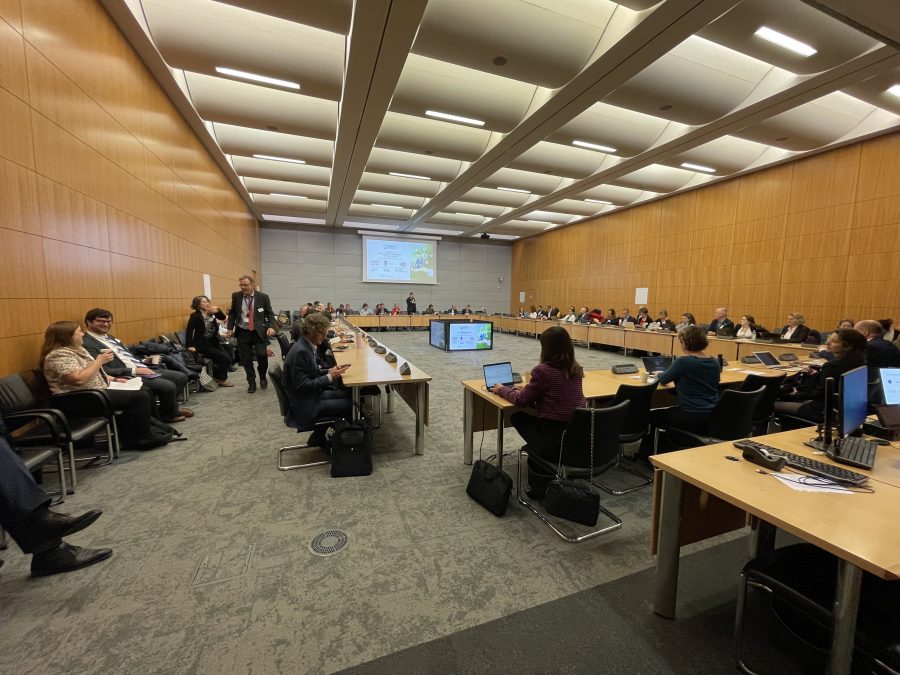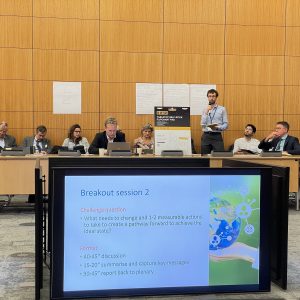Blog
Perspective: Leveraging Shared Passion for Sustainability to Nurture Collaboration in International Trade
In the Perspectives guest blog series, Farm Foundation invites participants from among the varied Farm Foundation programs to share their unique viewpoint on a topic relevant to a Farm Foundation focus area. Dr. Trey Malone, the 2023 Farm Foundation Agricultural Economics Fellow and an assistant professor in the Department of Agricultural Economics and Agribusiness at the University of Arkansas, contributed this guest blog. In October 2023, Malone attended the Global Forum on Farm Policy Innovation‘s first workshop, held in Paris on the topic of trade and sustainability. An in-depth paper summarizing the event’s key takeaways and next steps is forthcoming.
This past October, I was honored to attend the Global Forum on Farm Policy Innovation (GFFPI), hosted at the Organisation for Economic Cooperation and Development (OECD) headquarters in Paris. This first-of-its-kind partnership between the Farm Foundation, the Australian Farm Institute, the Canadian Agri-Food Policy Institute, and the Forum for the Future of Agriculture served as a melting pot of ideas and expertise. The event’s primary focus was to leverage our shared passion for sustainability to nurture collaboration in international trade. By bringing together diverse stakeholders, GFFPI aimed to foster innovative policies and practices, driving the agenda of sustainable development through international trade in the global agri-food economy.

As an agricultural economist at the University of Arkansas, I appreciated the global urgency for all countries to collaborate toward a more sustainable agri-food system. I left the event with renewed optimism about the potential for international partnerships to address sustainability concerns via flexible, innovative agri-food trade policy. Here are three areas discussed at the event that I found particularly worth exploring via global collaboration.
1. Global Dialogue on Environmental Impact Reporting
The need for a deeper global dialogue on environmental impact reporting in the agri-food supply chain is of paramount importance. The rising prominence of environmental impact reporting emphasizes its growing influence across the agri-food value chain. As someone deeply engaged in agricultural sustainability, I view these developments with anticipation and caution. The surge in transparency and the increasing demands from consumers and policymakers for clear, honest disclosures have compelled companies to set ambitious emission reduction targets. Yet, robust measurement and reporting challenges are substantial, marked by a landscape rife with inconsistent standards and new directives like the EU’s Corporate Sustainability Reporting Directive mandating Scope 3 emissions reporting.
I applaud the move towards greater transparency, empowering more sustainable production and consumption practices. However, I am also mindful of the potential ramifications. The diversity in methodologies could either spur innovation or sow confusion. A critical concern is whether this surge in reporting might unintentionally marginalize smaller or lower-income producers, who may lack the resources for compliance. The escalation in environmental impact reporting is an irreversible trend that demands vigilance from everyone involved in the food system. Ensuring that the frameworks we adopt genuinely advance sustainability without erecting new barriers is imperative. We must engage critically in these discussions, striving for systems that are transparent, equitable, and supportive of sustainable advancements. In pursuing environmental accountability, we must not lose sight of the intended purpose: to foster a sustainable, inclusive, and equitable agri-food system.
2. Consumer Awareness and Engagement
Increasing consumer awareness and engagement is pivotal in the journey toward sustainable food production, a theme echoed strongly at GFFPI’s workshop. Consumers play a crucial role in driving demand for sustainably produced foods, making their awareness and choices fundamental in shaping the agri-food market. The discussions at the workshop highlighted that an informed consumer base can significantly influence agricultural practices by preferring products that align with sustainable and ethical standards.
Consider gene editing, a revolutionary technology for creating more sustainable food systems. This cutting-edge technique can help develop more resilient crops to climate change, require fewer resources, and yield higher nutritional value. However, the success of gene editing hinges on consumer perceptions and acceptance, as widespread global misperceptions pose a significant barrier to adopting and advancing gene-edited crops. Consumers, often unaware of the benefits of gene editing, might inadvertently impede progress in agricultural sustainability due to these misconceptions. Addressing these misperceptions requires concerted efforts to educate consumers about the global importance of agricultural technology. These efforts must include providing factual information about the reduced need for pesticides, the potential for increased crop yields, and the ability to fortify crops with essential nutrients.
The GFFPI event underscored the need for comprehensive strategies to educate and engage consumers, as informing consumer choices requires supporting innovative technologies that promise a more sustainable agri-food future. As we look towards sustainable solutions in agriculture, ensuring public understanding and acceptance of these new technologies becomes as important as the innovations themselves. In this endeavor, it is vital to recognize that consumer education is a two-way street. The agri-food industry must not only disseminate information but also actively listen to and address consumer concerns, meeting people where they are in their understanding and perceptions. This approach fosters a dialogue-based relationship where consumer feedback can guide and improve industry practices. Policies worth exploring might include clearer labeling, public awareness campaigns, and collaboration between policymakers, producers, and retailers to facilitate easier access to sustainable food choices. Such efforts are crucial in building a more sustainable agri-food system, where consumer choices are not just about personal preference but also about contributing to global sustainability goals. By engaging consumers as active participants in the sustainability conversation, we can ensure that evolution within the agri-food sector aligns with both environmental imperatives and societal needs.
3. Economic Viability and Productivity Through Technology and Innovation
Environmental sustainability in agriculture is incomplete without economic viability for producers. Achieving a balance between these two elements is essential for the long-term sustainability of the agri-food sector. At the core of this balance is the understanding that economic productivity and environmental stewardship are not mutually exclusive; they can be synergistic when approached through innovative technologies and practices.
Consider advancements like artificial intelligence (AI), which has the potential to revolutionize agricultural practices. AI can optimize resource use, enhance crop yields, and reduce environmental impacts, thereby increasing the economic viability of farming while adhering to sustainability principles. For instance, precision agriculture, powered by AI, allows for the precise application of water, fertilizers, and pesticides, reducing waste and environmental damage. Similarly, AI-driven data analytics can provide insights for better crop management and decision-making, enhancing productivity and sustainability.
Transitioning to sustainable practices often requires initial investments that can be challenging for farmers, particularly smallholders. Subsidies, incentives, and fair compensation might play a critical role. By offsetting the initial costs and risks associated with adopting new technologies and practices, these financial mechanisms can make it more feasible for farmers to transition toward sustainable agriculture. They also serve as a recognition of the environmental services that sustainable farming provides.
Modern sustainability challenges require modern, innovative solutions. Policy decisions must be mindful of supporting the development of technologies that are accessible and affordable for farmers of all scales and regions. Innovations should not only focus on high-tech solutions but also on sustainably improving traditional practices. For example, integrating indigenous knowledge with modern technology can lead to more holistic and effective agricultural practices.
The challenge lies in ensuring that these technological innovations and economic incentives are designed and implemented in a way that truly supports sustainable agriculture. Collaboration among governments, private sectors, researchers, and farmers is required to develop solutions that are practical, scalable, and aligned with both environmental and economic objectives. Indeed, advancements in the agri-food sector must continue to evolve in a way that supports the planet and its people, ensuring the economic viability of farming while safeguarding the environment for future generations.
Toward Heightened Global Cooperation
International cooperation is indispensable in addressing the multifaceted sustainability challenges in the agri-food system. The complexities of global food production and consumption patterns necessitate a collaborative approach that transcends borders, integrating long-term sustainability goals with practical, immediate actions. This approach involves harmonizing policies and practices across nations while acknowledging and respecting regional and cultural differences. Meaningful dialogue between the public and private sectors is pivotal. Governments can set the sustainability agenda through public policy, regulatory reform, and incentives, enabling sustainable practices. Through public-private partnerships, agricultural policy might accelerate the private sector’s capacity for innovation, allowing the private sector to bring new technologies and processes to the forefront. The symbiotic relationship between these two sectors is essential for driving meaningful progress towards sustainability.

Furthermore, international cooperation is key to emphasizing open trade, transparency, and establishing common standards. Open trade facilitates the exchange of goods, services, and knowledge, fostering an efficient and sustainable global marketplace. Transparency builds trust and accountability, ensuring that all stakeholders, from farmers to consumers, are well-informed and engaged. Common standards, meanwhile, provide a benchmark for sustainability, ensuring that practices and products meet agreed-upon environmental and social criteria. Flexibility is also crucial in this global framework. Agricultural practices are deeply rooted in local cultures and ecosystems; thus, solutions must be adaptable to different regional contexts. What works in one part of the world may not be suitable for another, and policies must be sensitive to these differences.
The GFFPI workshop underscored the importance of global collaboration in tackling sustainability challenges. As a participant, I witnessed firsthand the power of diverse perspectives coming together to shape a resilient and sustainable future for agriculture. This experience reinforced my belief in the collective commitment required to make a lasting impact. It’s not just about individual actions but how we, as a global community, can unite our efforts and resources to create a sustainable agri-food system that benefits global society. The path ahead is complex and challenging, but with continued collaboration, innovation, and commitment through events like the GFFPI workshop, we can forge a prosperous and sustainable future for generations to come.
A version of this blog first ran in the November 23, 2023, issue of Farm Institute Insights, a publication of the Australian Farm Institute. It is reposted with permission.
